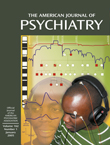Psychiatric Effects of Ephedra Use: An Analysis of Food and Drug Administration Reports of Adverse Events
Abstract
OBJECTIVE: As part of a synthesis of evidence regarding the efficacy and safety of ephedra, the authors describe data on psychiatric adverse events from reports submitted to the Food and Drug Administration (FDA). METHOD: The authors reviewed all 1,820 adverse event reports related to dietary supplements containing herbal ephedra from FDA MedWatch files as of Sept. 30, 2001. Fifty-seven serious psychiatric events were reported. RESULTS: The most commonly reported events were psychosis, severe depression, mania or agitation, hallucinations, sleep disturbance, and suicidal ideation. Ten events involved physical harm to self or others; five events resulted in legal action due to criminal behavior. Twenty-six events resulted in hospitalization, at least six of which were involuntary. Of importance, two-thirds of all cases involved patients with preexisting psychiatric conditions and /or use of other medications or illicit substances. CONCLUSIONS: Clinicians should be aware that serious psychiatric symptoms could be associated with ephedra use.



